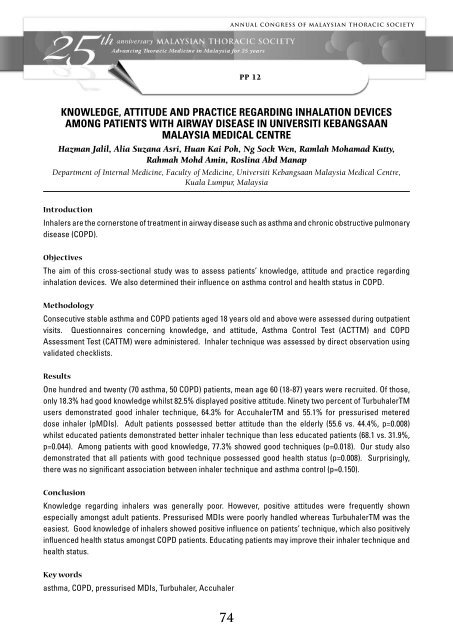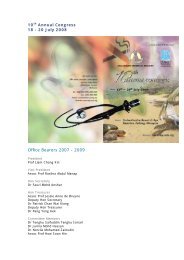download - Malaysian Thoracic Society
download - Malaysian Thoracic Society
download - Malaysian Thoracic Society
Create successful ePaper yourself
Turn your PDF publications into a flip-book with our unique Google optimized e-Paper software.
Annual Congress of <strong>Malaysian</strong> <strong>Thoracic</strong> <strong>Society</strong><br />
PP 12<br />
Knowledge, Attitude And Practice Regarding Inhalation Devices<br />
Among Patients With Airway Disease In Universiti Kebangsaan<br />
Malaysia Medical Centre<br />
Hazman Jalil, Alia Suzana Asri, Huan Kai Poh, Ng Sock Wen, Ramlah Mohamad Kutty,<br />
Rahmah Mohd Amin, Roslina Abd Manap<br />
Department of Internal Medicine, Faculty of Medicine, Universiti Kebangsaan Malaysia Medical Centre,<br />
Kuala Lumpur, Malaysia<br />
Introduction<br />
Inhalers are the cornerstone of treatment in airway disease such as asthma and chronic obstructive pulmonary<br />
disease (COPD).<br />
Objectives<br />
The aim of this cross-sectional study was to assess patients’ knowledge, attitude and practice regarding<br />
inhalation devices. We also determined their influence on asthma control and health status in COPD.<br />
Methodology<br />
Consecutive stable asthma and COPD patients aged 18 years old and above were assessed during outpatient<br />
visits. Questionnaires concerning knowledge, and attitude, Asthma Control Test (ACTTM) and COPD<br />
Assessment Test (CATTM) were administered. Inhaler technique was assessed by direct observation using<br />
validated checklists.<br />
Results<br />
One hundred and twenty (70 asthma, 50 COPD) patients, mean age 60 (18-87) years were recruited. Of those,<br />
only 18.3% had good knowledge whilst 82.5% displayed positive attitude. Ninety two percent of TurbuhalerTM<br />
users demonstrated good inhaler technique, 64.3% for AccuhalerTM and 55.1% for pressurised metered<br />
dose inhaler (pMDIs). Adult patients possessed better attitude than the elderly (55.6 vs. 44.4%, p=0.008)<br />
whilst educated patients demonstrated better inhaler technique than less educated patients (68.1 vs. 31.9%,<br />
p=0.044). Among patients with good knowledge, 77.3% showed good techniques (p=0.018). Our study also<br />
demonstrated that all patients with good technique possessed good health status (p=0.008). Surprisingly,<br />
there was no significant association between inhaler technique and asthma control (p=0.150).<br />
Conclusion<br />
Knowledge regarding inhalers was generally poor. However, positive attitudes were frequently shown<br />
especially amongst adult patients. Pressurised MDIs were poorly handled whereas TurbuhalerTM was the<br />
easiest. Good knowledge of inhalers showed positive influence on patients’ technique, which also positively<br />
influenced health status amongst COPD patients. Educating patients may improve their inhaler technique and<br />
health status.<br />
Key words<br />
asthma, COPD, pressurised MDIs, Turbuhaler, Accuhaler<br />
74








